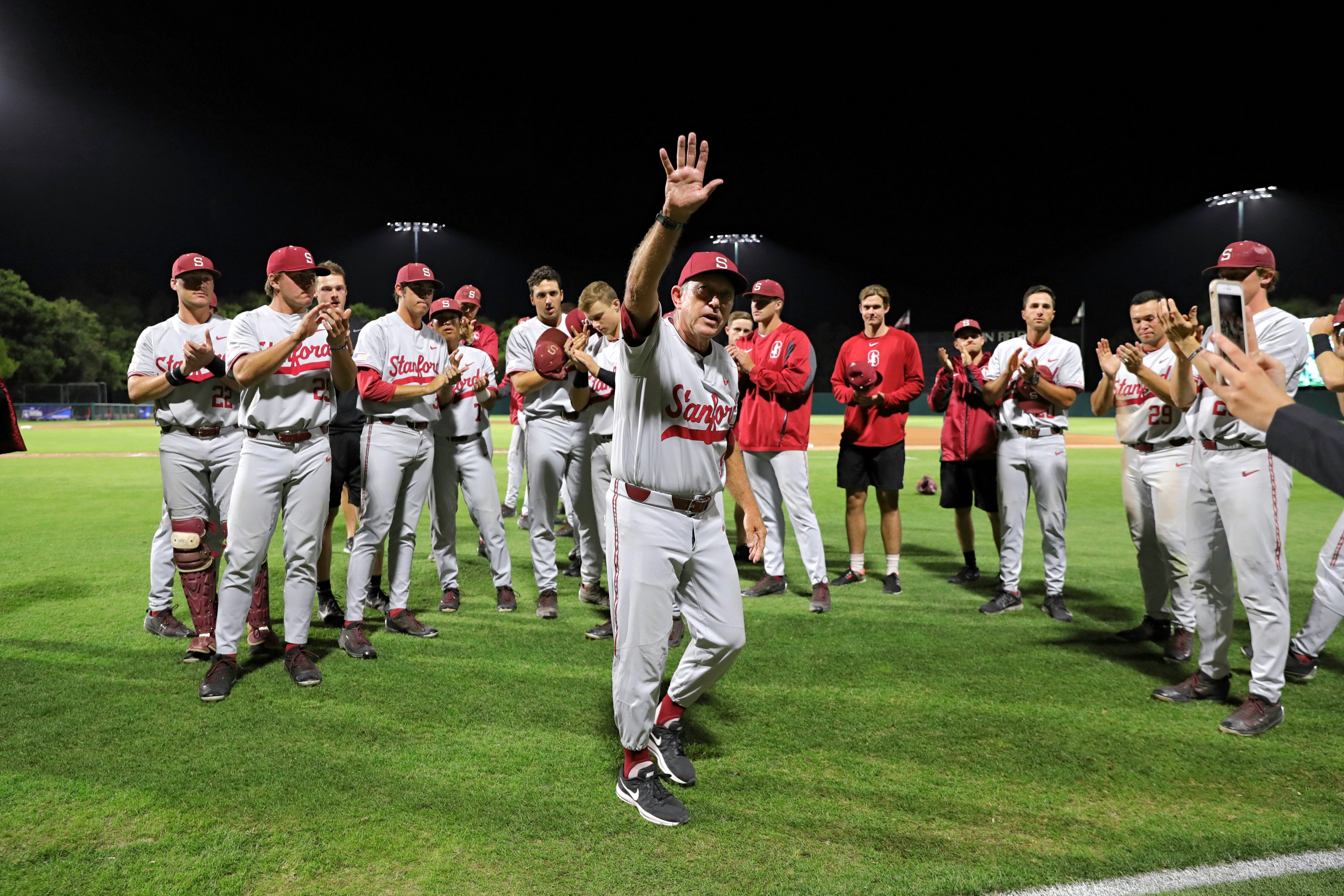Is there really any “good” way to send off a living legend?
Stanford baseball truly did everything it could to write a perfect final page for the 41-year-long epic of its beloved leader, Mark Marquess.
But the magic of the dreamlike final season faded on a chilly Saturday night at Sunken Diamond when senior Jack Klein grounded out to second base to seal a 4-2 loss to No. 2 seed Cal State Fullerton that officially ended No. 1 seed Stanford’s 2017 campaign.
“I think it was just a bunch of emotions running through me at that moment,” Klein said. “It was a lot. We were disappointed. We all believed we were going to go all the way and make this a really cool special last season [for Marquess].”
And unbelievably, just like that, it was over. Goodbye, Nine. Forty-one years in the books. An end of an era. Full stop.
“It really hasn’t sunk in,” Marquess said. “I’ve done a good job of keeping it focused on the team, I really have.”

This Stanford team rose to No. 8 in the country, won 21 conference games, finished second in the Pac-12 and hosted an NCAA Regional. The Hollywood finish was set up perfectly; it seemed only fair that Nine would make it back to Omaha for a 15th and final time.
But Cal State Fullerton had other ideas.
Two days after John Gavin stymied Stanford batters for seven innings, sophomore Colton Eastman pitched 6.2 stellar innings for the Titans and Stanford’s few opportunities for rallies were never realized as the Cardinal were held to just two runs on three hits in their second straight loss to Fullerton.
“We’re all very disappointed, but Fullerton was better than we were, and I want to wish them the very best of luck,” Marquess said. “They’re an outstanding team.”
The Titans got to Stanford freshman starter Erik Miller early, hitting him for a two-out run in the first after a single from Dillon Persinger and an RBI double by Timmy Richards after a bang-bang play at the plate. A two-run homer by Scott Hurst followed in the second inning.
Although Stanford took advantage of a lucky bounce and two errors by the Fullerton defense to push across a run of its own in the second and got a runner on base in each of the last four innings, the Cardinal just couldn’t break through against the Titans’ stellar pitching staff.
“We gave it all we had, and it just came up a little bit short,” Klein said.
Despite the result on Saturday night, Marquess remains proud of the 2017 Stanford Cardinal — while he pointed out that this iteration of the team wasn’t the most talented he had on the Farm, he can’t remember any of his other 40 teams at Stanford going on quite a tear like this year’s squad did, winning 21 of its final 23 games to race into the postseason as one of the hottest teams in the nation.
The 21 wins in conference play were the most for the program since 1998, and the 42 overall victories were its most since 2004.
“Happy with our season, but disappointed tonight,” he said. “The problem with going to the postseason is that there’s only one team that’s going to be happy. I’m very disappointed, but there’s going to be a lot of disappointed teams. I’m very proud of this group.”
That’s saying a lot, coming from a man who led the Cardinal to the postseason 30 times, 14 College World Series appearances and the program’s only two national championships. He is one of only five NCAA coaches to reach 1,600 career wins. And perhaps most remarkably, 38 of his 41 teams finished with winning records.
Thank you, 9⃣ pic.twitter.com/Vfbv7ZB6lm
— Stanford Baseball (@StanfordBSB) June 4, 2017
In the end, he departs Stanford with a list of accolades too long to name and having impacted more lives than can be counted in the 50 years he spent on the Farm as a student-athlete, assistant coach and finally as head coach.
After the conclusion of Saturday night’s game, players and their families lingered, hugging, crying, reminiscing — but eventually, they, too, went home, leaving just an unassuming, completely empty Sunken Diamond basked in the glow of its harsh white lights.
That is, until Marquess and his wife, Susan, emerged from the left-field batting cages. They strolled across the field, stepping over the white number “9” painted into the grass behind home plate — a number that will never again be worn at Stanford —as Nine, trusty briefcase in hand, departed his home field for the final time as head coach.
The path ahead lies beyond the familiar lights of Sunken Diamond that he left behind on that walk, but nobody knows where exactly that path will lead — especially not Marquess, ever the creature of habit.
“I don’t know,” he said. “That’s the scary part. I really don’t. The good part is I was able to concentrate just on the baseball and immerse myself in that. The scary part is I haven’t thought about what’s next. I really haven’t.”
And can you blame him? Forty-one years of old habits die hard.
https://twitter.com/dohyoungpark/status/871229512964382720
Contact Do-Hyoung Park at dhpark ‘at’ stanford.edu.
